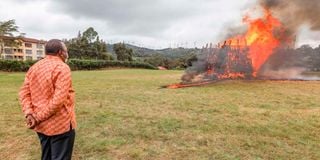Premium
Kenya, peers target light weapons trade in fight against terrorism

President Uhuru Kenyatta looks on as a cache of 5,144 illicit small arms and light weapons that he set on fire burns at the Regional Police Traffic Training Centre in Ngong, Kajiado County on June 9, 2021.
Governments across the world may be indirectly aiding terrorism and conflict by continually trading in small arms and light weapons, without an attendant tracing mechanism to ensure they only end up in the right hands.
The conclusion emerged on Tuesday as Kenya joined United Nations Security Council (UNSC) members in seeking adequate regulations to adhere to arms embargoes and other restrictions on weapons sales, seen as key in taming their flow to terrorists.
In an open debate on small arms and light weapons, members such as Kenya, India, the US and others on the UNSC cited the need to manage both stockpiles of weapons purchases, keeping an inventory of supply chains and restricting distribution to armed groups through illegal channels as crucial to limiting the spread of terrorism and conflict.
“To us, a key point to achieve success is for states and the UNSC to attack the criminal economies that feed insurgents and terrorists including through the weapons trade,” said Martin Kimani, Kenya’s Permanent Representative to the UN, referring to the Open Debate chaired by Mexican Foreign Secretary Marcelo Ebrard, whose country is the current president of the UNSC.
Kenya and other members spoke while referring to their past experiences with terrorism, insisting that a limited supply of small arms and weapons could cut down incidents and probably eliminate them. Last month, while Kenya presided over the UNSC, it held a briefing session on small arms and light weapons, calling for equal focus on such weapons as that given to chemical and nuclear weapons.
According to Sanjay Bhattacharya, India’s secretary for consular, passport, visa and overseas Indian affairs, member states bear the primary responsibility of addressing illegal arms sales or supplies to non-state criminal groups.
“The increase in volume and the quality of the small arms acquired by terrorist organisations reminds us time and again that they cannot exist without the sponsorship or support of states,” he told the UNSC’s debate, suggesting that some states have clandestinely supplied drones and other modern weapons to terrorist groups.
“We also call for greater focus on the terror-crime nexus, in particular, the thriving illicit network for procurement and transfer of small arms and financing for such procurement and logistical activities.”
In regions where terrorism has persisted, such as the Sahel, Horn of Africa, Middle East and parts of central Asia, the Indian diplomat blamed weak obedience of sanctions and arms embargoes by governments that have worked with terrorists.
“In this regard, an arms embargo remains an important tool that the Council has at its disposal to curb the flow of such weapons to situations of armed conflict.”
The US endorsed calls for arms embargoes to be respected, but said the lax implementation is often a result of member states choosing to look the other way, rather than the poor design of those restrictions.
“Like many of these international instruments, arms embargoes are only effective when implemented by member states. We encourage all member states to ensure they are fully implementing their obligations pursuant to Security Council arms embargoes,” said Jeffrey DeLaurentis, a senior adviser for special political affairs at the US Mission to the UN.
This was the latest in a series of many meetings held since last year to discuss the menace of small and light weapons. In parts of Africa such as Kenya, illicit weapons in the hands of criminals are often blamed on porous borders and an unstable neighbourhood that sustains the flow of arms.
But the UNSC has also been unable to enact a stronger structure that demands sellers to keep track of and cut off buyers who lend the weapons to criminals.
In 2002, for instance, India had led governmental experts’ groups that helped form the open-ended Working Group to design a tracing protocol for weapons. It has yet to be fully implemented.
Dr Robin Geiss, the director of the UN Institute for Disarmament Research (UNIDIR), told the UNSC that diversion and trafficking of weapons is hurting global peace-building efforts, making it difficult to control arms trafficking.
“States affected by patterns of recurring armed violence, therefore, face many challenges to prevent the diversion and misuse of arms,” Geiss said.
“Diversion and trafficking of arms destabilises communities and exacerbates situations of insecurity, including by committing serious violations of international humanitarian law and human rights law, as well as violence against women and children in various contexts.”





